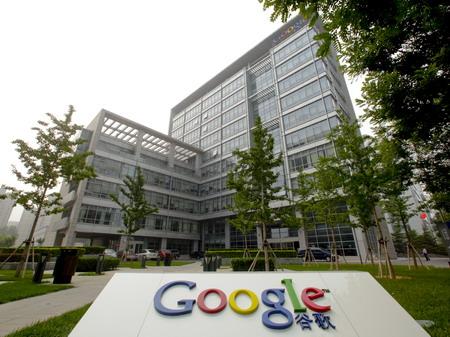
Google China's headquarters in Beijing. Google has been on a hiring spree this year after losing many top engineers and executives. [Photo / Bloomberg]
Search giant recruiting more engineers for challenges aheadSHANGHAI - Internet search giant Google Inc has recruited its highest annual number of engineers in China this year, after the recent departures of many top engineers and executives.
Many Chinese engineers still hope to work for Google, said Boon-Lock Yeo, head of engineering and research at Google China, whose public appearances in Shanghai have been rare since Google began redirecting traffic from the mainland to its Hong Kong site in March.
"This year is the best year ever in hiring since we entered the mainland five years ago," said Yeo. He added that employment numbers are increasing every year, and the company has received a record amount of resumes from Chinese applicants since the start of 2010.
Although he declined to reveal the exact number of people Google China has recruited, Yeo said "several hundreds of engineers" are currently working for the company.
On Tuesday, Chinese media reported that Lin Bin, deputy head of engineering and research at Google China, had left the company to start his own business.
Lin's departure demonstrates that the Internet search engine still faces staff turnover challenges, especially as five out of six deputy heads of the company's research and development (R&D) section have moved on.
Yeo denied that Google China is facing a brain drain, stating that the younger generation of engineers are proving their abilities and doing a good job.
"Compared with the average employee turnover rate of 20 percent in Chinese IT companies, Google experiences a far lower figure," he said.
According to Yeo, Google's Beijing R&D facility, established in 2005, is the biggest of eight such centers in Asia. Its major task is to research and develop search innovations for both the local and international markets.
The company established its Shanghai R&D center in 2007, with a focus on innovation in advertising.
"Our commitment to China stays unchanged," Yeo said. He pointed out that search and advertising are still the two main R&D fields for the company.
"We also want to expand into mobile Internet, since it is a major sector," said Yeo, adding that almost all of the projects under development are related to mobile Internet use.
Meanwhile, Google Shopping, a product-searching function, is another major research priority.
The company launched its Chinese version of Google Shopping in 2009.
Gu Xuemei, e-commerce director of Google China, said the company aspires to further develop product searching because "it is quite a cash cow".
"We know many e-commerce websites provide product searching, such as Amazon in the United States and Taobao in China. Google may become marginalized in this area if people simply look to e-commerce sites when they search for goods," Gu said.
"Google doesn't sell products, so we are quite neutral," said Gu, who added that, compared with some e-commerce websites which may give undue prominence to certain goods or companies, Google may make customers more comfortable.
Advertisements contribute the biggest portion of revenue for Google, both in China and overseas, and the company said on Thursday it has more than one million AdWords advertisers worldwide and another million AdSense publishers globally.


